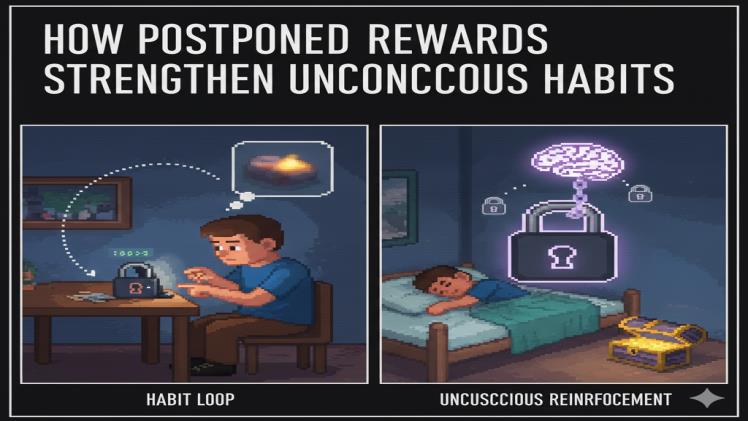
You may also assume that the only thing about habits is that we must use our willpower to get ourselves to bed early, go running, or adhere to a budget. But the truth is far sneakier. In many cases, the process of perpetuating a habit is not conscious but rather the hidden workaday work of gratification, which changes your behaviour without you even noticing.
Contents
The Splendid Tug of Long Payback.
Short-term benefits are evident: you take a bite of chocolate and get an adrenaline rush, or check your phone and get a hit of dopamine when someone likes one of your posts. But delayed rewards? They are the unspoken, silent builders of your daily life. They do not shout to get your attention, but when time passes, they form patterns of conduct that become permanent.
Think of learning a new skill or saving money. It is not the fulfilment of pleasure at once. There is no instant applause or notification ping, but weeks or months later, your brain is rewired. You discern improvement in areas that you hardly pay attention to, creating a dopamine loop that is not about immediate gratification, but about longer-lasting interaction. This reinforcing loop is subtle, and this is what makes habits strong.
The Psychology of Stickiness.
It is interesting here that it becomes fascinating. Your brain is programmed to pursue rewards, and dopamine is the currency of this pursuit. But it is not only the reward, it is the expectation of it that makes the habit addictive.
Delays in rewards cause your brain to run through wave after wave of anticipation. The circuits in the nucleus accumbent and other areas of the mesolimbic pathway reinforce the behaviour over time, strengthening it. Similar to our behaviour of checking our progress made towards a savings app daily, or reengaging in a skill, this is the process of reinforced learning that you can be doing, unaware that you are thinking about it consciously. With time, it becomes nearly a habit; decision fatigue becomes less important since your brain is silently carrying a heavy load.
Online Interaction and Changeable Rewards.
It is a mechanism you have probably observed if you are accustomed to online gaming or gambling. An example of this is the experiences provided by sites such as National Casino Argentina. Although they were not discussing actual gambling advice, they are enlightening regarding design principles. The same delayed gratification mechanisms are manipulated through variable rewards, such as occasional unlocks of bonuses or tournament rewards. The brain fails to receive a consistent reward: sometimes large, sometimes small, sometimes none. And that uncertainty? It is the key to the persistence of habits.
The same can be applied to gamified applications, sports bracelets, and even poker online casino. The expectation of a future reward will hold your attention and shape behaviour in the long run. You are not playing or following; you are unknowingly getting involved in a well-defined, well-honed pattern of behaviour, supported by delays, unpredictability, and digital signals.
Making Delayed Rewards Work to Your Benefit.
Learning about the strength of delayed rewards can change your attitude toward your daily activities. Want to cultivate a habit? Short, small milestones must be introduced with rewards spaced over time. It is a little trick that involves progressive brain changes, and you should not expect the dopamine burst to be immediate. The streak-promoting apps or gradual-goal ones are based on the principle that applies even when you are not connected to the internet, whether you are learning a language, exercising, or practicing a skill.
And though online engagement may be an effective incentive, there is awareness. Understanding the effects of anticipation and delayed rewards on behaviour will enable you to use them to your advantage — rather than letting your cognitive biases guide you without realizing it.